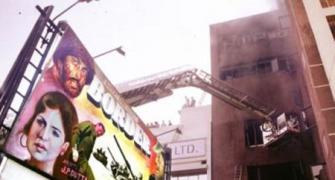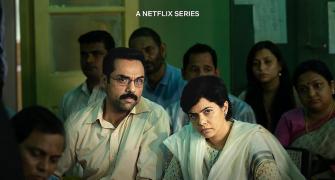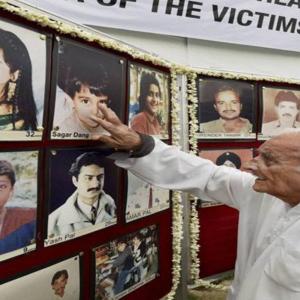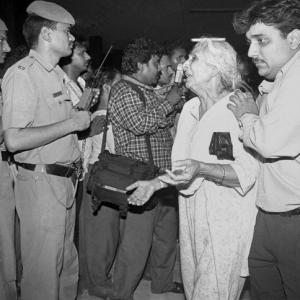What works for Trial By Fire is Rajshri Deshpande's and Abhay Deol's portrayal of the distraught parents who struggled and toiled for justice for over two decades, observes Utkarsh Mishra.

Ever thought what we, common citizens with no political connections whatsoever, would do if we had a brush with the country's law enforcement?
What if we need to take judicial recourse?
What if we need to depend on these institutions to redeem our lives?
And, what if those against whom we are fighting turn out to be business magnates with enormous connections and resources to wriggle out from the clutches of law, if it ever catches up to them?
It could be a tale of endless despair in a country like ours.
And it could also lead us somewhere, where we can find some sort of consolation that we went on despite all odds and never gave up.
It can make examples out of us and others in a similar situation may look up to us for inspiration.
In any case, our lives can never remain the same even if we find closure.
Trial by Fire is one such tale of a perfectly ordinary couple, who went through immense pain and suffering to seek justice after losing both their children to a preventable disaster.
It is the story of Delhi residents Shekhar and Neelam Krishnamoorthy -- played by Abhay Deol and Rajshri Deshpande in the Web series -- whose teenage daughter and son died in the Uphaar Cinema Fire of 1997, along with 57 others.
While the families of many victims consider it an unfortunate accident and ready to accept their fate, the Krishnamoorthys realise that the deaths could have been prevented if only some of those responsible for running the theatre would have done their jobs honestly.
They pin the blame on real estate barons Sushil and Gopal Ansal, whose quest for profit, they say, led to their staff overlooking all safety measures to make sure that more and more people buy tickets to watch the popular film that was being screened that day.
In November 2021, a court in Delhi had sentenced the Ansals to seven years in prison and imposed a fine of Rs 2.25 crore for 'tampering with the evidence'.
This crucial development that once seemed impossible was largely the outcome of the efforts of the Krishnamoorthys and the Association of the Victims of Uphaar Tragedy (AVUT) that they formed with the family members of several other victims.
Such is the gravity of the subject Trial by Fire portrays.
While the series tries to do full justice with the subject, the execution of the story often seems lackadaisical, especially towards the later episodes.
What works for Trial by Fire is Deshpande's and Deol's portrayal of the distraught parents who struggled and toiled for justice for over two decades in the face of severe hardships.
Though they are a well-to-do family, owning a computer, car and WLL phones in 1997, their complete helplessness is quite palpable when they have to deal with institutions of the state.
The first few episodes are about the couple's unimaginable trauma, society's attitude towards them and their own internal struggles to grapple with reality, to find a closure, to adjust to the new normal and to realise that they can't run away from it as much as they try to do.
The series grips the viewer from the very beginning.
However, as the story progresses, it seems to lose track and it is not until the last episode that one is fully back into it.
Apart from the real-life characters, there are several fictional ones.
But the stories of some major fictional characters seem incomplete, or they have not been exploited to their fullest.
The characters portrayed by Anupam Kher and Ratna Pathak Shah, for example. When they are introduced in the fifth episode, you think they are loosely based on the life of Captain Manjinder Singh Bhinder and his family. Captain Bhinder gave up his life and those of his wife and four-year-old son in order to save over 150 others. (Not showing Captain Bhinder's story is a major omission by the series.)
However, the characters simply turn out to be helpless victims. It doesn't seem justifiable to cast such accomplished actors in roles written like this that do not add anything significant to the story.
Moreover, one would expect that a character, like the one played by Ratna Pathak Shah, would have joined the AVUT and played a significant role in it. But it doesn't happen.
Similarly, Shilpa Shukla playing the seemingly considerate neighbour and 'a friend in need' of the Krishnamoorthys, disappears from the story right after some startling revelations about her.
Episode 6 telling the story of an electricity board worker, who is being made a scapegoat in the case, is chaotically edited. It has so many time-jumps that it loses the viewer after a point.
One would also have liked to see more of the courts.
Although the AVUT's struggle to bring out the truth is not inadequately represented, what is missing is how the prosecution eventually trumped the Ansals' defence.
While it also hints at the complicity of the government and officials of the investigating agency with the Ansals, it is done rather half-heartedly. And it is also not properly shown how in the end, the court disregarded this to convict the Ansal brothers.
The series seems to show that the Ansals were single-handedly responsible for the tragedy (no wonder they went to court seeking an injunction against its release).
Other perpetrators, or 'villains' as the series calls them, get their comeuppance, or reach a point of regret.
All this somehow puts the larger fight into background.
Though there are points in the story where the protagonists and others talk about bringing changes to the system, and making efforts to get fire safety measures installed in schools and other buildings, there should have been a bigger focus over such details.
However, the series redeems itself in the final episode that showed the tragedy being played out.
Its execution is so good at times that you might find yourself choking and gasping for breath.
Although, the end could have been a little less abrupt. Perhaps a sequence giving a sense of closure to the Krishnamoorthys and other members of AVUT, while also making it clear that the fight over the larger issue continues.
Overall, the series picked up a sombre subject and tried to do justice with its portrayal.
The acting performances are all noteworthy, especially Deshpande's representation of a mother's anguish and a seemingly endless quest for justice.
If not for a few loose ends, it could have turned out to be much better.










